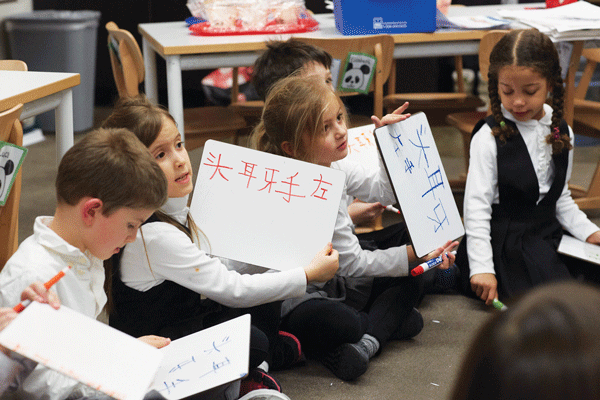The World School is a Chinese immersion private school located in the heart of Chelsea, NYC. The school's premium price tag of 50K USD per year and celebrity kid attendance (Tom Cruise-Katie Holme's daughter attends the school) speaks for itself.
I had the pleasure of sitting down with one of the school's veteran teachers (who prefers to remain anonymous) for an in-depth interview. She gave me insight into the school's immersion program. She also explained why parents are willing to pay top-dollar for tuition and if language immersion is the future.
 Courtesy of Avenues: The World School
Courtesy of Avenues: The World School
-Tell us a little about yourself
"I’m a teacher who has taught [in] both public and private schools, and I have experience in teaching English to speakers of other languages and Chinese as a foreign language. Right now, I teach Mandarin Chinese in an immersion classroom. I have taught students of all ages from three years old to graduate students both in English and Chinese in the US, as well as in China."
-Did you teach language immersion before Avenues?
"I did not teach language immersion, or at least I did not teach in a formal immersion language school setting before Avenues. When I was a Chinese teacher, I did try to incorporate more immersion like when I taught a summer camp in an immersion setting. Maybe it is better to say that our school is an immersion school rather than language immersion. It is not just teaching language in an immersion setting, we are in a school, teaching everything in the target language."
-So what exactly is teaching language in an immersion school like, and how is that different from the traditional way of teaching language?
"Well, that’s a good question. I keep telling people I’m not a language teacher, I teach in Chinese, but I don’t just teach Chinese. There’s a distinction between [the two]. If you’re a language teacher, then your focus is to teach language skills to students, but if you’re an immersion teacher you just treat language as a means to teach other subjects.
We do everything as any other monolingual schools do, but our language skills are being introduced or taught in a more subtle way. As an immersion teacher, we teach math, reading, social studies, history, art, music in the target language. This is more demanding for the teachers because not only [do] you have a [subject] content goal that you want to convey to the students, you also must pay attention to your language goal. It’s like two parallel train tracks that immersion teachers design, evaluate, and execute at the same time which ultimately leads to the same station, that being of a student's holistic academic success."
-What would be a sample of a typical day/week of the language immersion program in your school?
"So our school has a 50-50 model. [It] means one day from the perspective of a student, he or she is in a class that only uses Chinese to communicate. And the next day, he or she is in another classroom where English is the main language of communication. Throughout the day, they also attend other classes, two of which are still taught in Chinese- art and music. And two others are taught in English- science and physical education."
-Why do you think some parents are willing to pay $50,000 in tuition for this school?
"Well, I guess (chuckle) if you could summarize it as there are a few reasons. Number one would be that they can afford it. When you can afford it, then you have more options. When you have the financial freedom, you go for what you think is the best for your child or for yourself. Second, with what the world’s socio-political or economic status is shifting towards, contemporary China is becoming more and more important as a nation. Many parents, they see the status quo and the potential of learning the language for the near future. Some parents are already doing business with China or in the Asian market, and so they want their children to get both the language skills and a global mindset. It’s like the movie, Arrival, where it says that the language you speak has actually a very large impact on how you act and think. So I think many parents realize the value of having their kids to be able to speak a complicated language such as Mandarin Chinese or understand how Chinese people think."
-Can language immersion be adapted to a wider schooling system and be the future of language learning in America?
"In my opinion, the short answer is yes. Although, I want to say when you say language immersion, it seems like your focus is still on teaching language in an immersion setting, then yes it is possible and in fact, many language teachers are striving for exactly that. Still, that is not what our school is about, we are not about teaching language in an immersion setting. Our school is a total immersion school which strives to reach a higher standard to educate the future global citizens in a setting where they can be fluent in both languages. But teaching language is not only a goal, it’s almost like a by-product of our education style. When you really put people in a natural bilingual or trilingual environment as people do have in places like Europe, it is really about open mindedness and the mindset of the people. The skills of acceptance and respect towards all people and their differences that’s really critical for the 21st century, which is also why I think Avenues is called a school of new thoughts, and why it is appealing to many parents."
Having also worked in the school as a language teacher, I have seen first hand the usefulness and effectiveness of a language immersion school. At the same time, like most people, I do not have the means to afford the expensive price tag the school demands. Until the current educational system for language undergoes a holistic evolution, there will continue to be a growing inequality gap.
This Interview was edited for clarity and brevity.
[zombify_post]


0 Comments